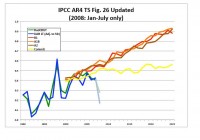By Timothy Gardner, Reuters
Eight scientific organizations urged the next U.S. president to help protect the country from climate change by pushing for increased funding for research and forecasting, saying about $2 trillion of U.S. economic output could be hurt by storms, floods and droughts. “We don’t think we have the right kind of tools to help decision makers plan for the future,” Jack Fellows, the vice president for corporate affairs of the University Corporation for Atmospheric Research, a consortium of 71 universities, told reporters in a teleconference on Wednesday. The groups, including the American Geophysical Union and the American Meteorological Society, urged Democratic presidential candidate Barack Obama and Republican rival John McCain to support $9 billion in investments between 2010 and 2014 to help protect the country from extreme weather, which would nearly double the current U.S. budget for the area. The U.N.’s science panel says extreme weather events could hit more often as temperatures rise due to climate change. The investments would pay for satellite and ground-based instruments that observe the Earth’s climate and for computers to help make weather predictions more accurate. Neither campaign responded immediately to questions about the plea for funding.
The groups, including the American Geophysical Union and the American Meteorological Society, urged Democratic presidential candidate Barack Obama and Republican rival John McCain to support $9 billion in investments between 2010 and 2014 to help protect the country from extreme weather, which would nearly double the current U.S. budget for the area. The U.N.’s science panel says extreme weather events could hit more often as temperatures rise due to climate change.
John Snow, the co-chairman of the Weather Coalition, a business and university group that advocates for better weather prediction, said improved computers would help scientists forecast extreme weather events more locally, which could help cities better prepare for weather disasters. It could also help businesses that produce virtually no greenhouse emissions, such as wind farms, know where to best locate their operations, he said. The scientists said cooler temperatures in the first half of this year are making their task more difficult. “One of the challenges we face is to make the case that while we are in a period of warming, we should not expect every year to be the warmest year on record,” Snow said. Read more here.
Icecap Note: We believe money for upgraded satellite and improved surface sensing systems is important but that funding for greenhouse warming research and modeling should be slashed. It makes no sense in throwing good money after bad. This research and the models have miserably failed in assessing the real causes of climate change and correctly predicting even the near term climate. More research dollars should be put to studying the sun and oceans, urban and local land use factors, and changes in clouds the real causes of climate changes we have observed the last century. The group of course will use the final landfall of Fay in the Gulf next week and later season storms to try and make their case but congress should resist. See how more and more scientists are saying the cooling will continue, further falsifying the AGW hypothesis here and here.

See larger image of IPCC 2007 model forecasts versus actual temperatures here.


